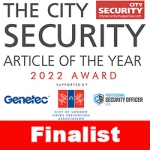A resilient security workforce has new meaning now
 How does one build and maintain a stable, strong, healthy, and capable security workforce? It’s a question that has taken on additional significance over the last 18 months.
How does one build and maintain a stable, strong, healthy, and capable security workforce? It’s a question that has taken on additional significance over the last 18 months.
Many topics that once fell under the broad banner of wellbeing, all too often an area of hashtags and platitudes, but not nearly enough action or policy, have been forced front and centre in public discourse and business planning.
What defines a healthy and resilient security workforce is likely very different to most casual observers from what it was prior to the outbreak. To say that the COVID pandemic has brought the complexities of wellbeing into sharp relief for our industry would be an understatement. This is a good thing.
Broadening our view of wellbeing
Data published by the ONS in December 2020 demonstrated that so-called “low-skilled” workers in service industries were at the highest risk. This specifically cited care workers, service jobs… and security guards. The main factors included proximity to risk due to age and working location, but also included the reality of being a frontline worker in a public health crisis where higher than level interactions with other people and materials is integral to the job.
Unlike many other industries, security cannot be properly maintained at a distance.
Where many professions have been able to transition to remote working, the premises they left behind still need physical security. Indeed, the threats security professionals are now expected to mitigate have expanded and changed as hybrid working trends, commuter and consumer trends, and continued public health requirements have evolved over the last year. There is no reason to expect this trend to slow, much less reverse! It may be a cliché to say, but the post-pandemic world is going to look and work differently to the old.
Just as operational health and safety needs have shifted as a result of the pandemic, so has the need to recognise the wide range of support employees are now looking for when considering security careers. While businesses are not a stand-in for policy or national funding, employers have a role to play in constructing workplaces and practices which consider wellbeing through a much wider lens than traditionally viewed.
Mental health is health
My organisation joined the Time to Change challenge launched four years ago by Mental Health at Work, committing to centre mental health awareness and support in our Health and Safety commitments.
Though it may seem hard to remember in the current climate, mental health was not at the forefront of our industry’s mind at the time. It was gaining broader culture traction, including the Heads Together campaign launched by members of the Royal Family.
Some activists and campaigners were dogged in their commitment to raising awareness, and some well-established charities were committed to providing emergency mental health care. But, funding for mental health has long been uneven and has been traditionally treated as somewhat separate from other health issues.
The COVID pandemic has forced what is likely to be a permanent reconsideration of this approach. A much more holistic approach to overall wellbeing is now more prominent, and this is unlikely to be reversed. This should be viewed as a welcome shift and security organisations of all sizes should be considering the implications on their workforce now.
Mental health is not a separate issue, it’s part of a larger whole. The reality is that personal health experiences are unique to individuals and families. Within a single household there is likely to be a combination of working and education patterns, caregiving requirements, and health circumstances ranging from visible disability to hidden challenges.
Meanwhile, there is excellent public reporting on the impact of the pandemic on relationships, housing situations, children’s schooling, household finances and more. Any employer who assumes these stressors are not following their colleagues into their workplace, especially against a backdrop of truly global uncertainty, is not being realistic. Nor are they considering the longer-term impacts.
We’re in this together… but not out of the thick of it yet!
We are not yet fully emerged from the pandemic, and we are just beginning to experience what is likely to be many years of ripple effects across workplaces, educational patterns, and more. Attracting, training and retaining talent will require our industry to think in new ways, offer new paths to careers, and yes, think of new packages that address people’s holistic health needs.
In March of this year the UK Government announced that it would expand mental health services as part of its Mental Health Recovery Action Plan, with new resources for training, services, local authorities, and more. The physical and emotional effects of the COVID pandemic were repeatedly cited, for good reason. And delving into the announcement, many specific needs were called out as areas of funding under the broad banner of mental health. These included talk therapies and suicide prevention, but also individuals with dementia and other cognitive diseases, young people and university students, and long-under-privileged communities. It’s a tacit acknowledgement that different audiences and groups require different kinds of support.
Employers in the security industry with an eye to the future should be taking a similar approach to their health, safety, and wellbeing initiatives and commitments.
A broad concept of employee wellbeing will be central to these efforts because we know this is not the last risk our industry will be expected to contain or respond to. A secure, resilient, healthy, and engaged workforce now is the best bulwark against future challenge.
Organisations who fail or refuse to plan for that now are risking their own future.
Click here to read more articles from Wilson James
Click here to read more articles on Security Management
Cadence Woodland
Head of Communications
Wilson James



